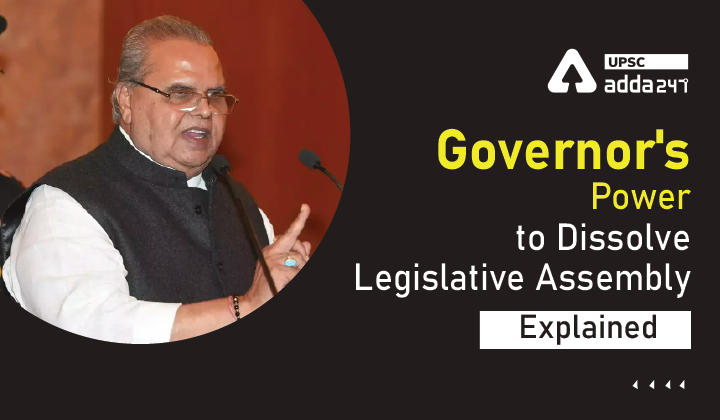Table of Contents
Governor Powers- Relevance for UPSC Exam
- GS Paper 2: Indian Constitution- Historical underpinnings, evolution, features, amendments, significant provisions and basic structure.
Governor Powers in News
- In the present tussle for power in Maharashtra, the Governor’s powers under the Constitution to call for a floor test takes centre-stage in the power struggle.
Governor’s Power to Dissolve State Legislative Assembly
- Article 174(2)(b) of the Constitution: It gives powers to the Governor to dissolve the Assembly on the aid and advice of the cabinet.
- Exception to Article 174(2)(b): However, the Governor can apply his mind when the advice comes from a Chief Minister whose majority could be in doubt. This is governor’s extra-constitutional discretionary power.
- Article 175(2) of Indian Constitution: Governor can summon the House and call for a floor test to prove whether the government has the numbers.
- Article 163 of the Indian Constitution: When assembly is not in session, Governor’s residuary powers under Article 163 allow him to call for a floor test.
- When the House is in session, it is the Speaker who can call for a floor test.
National Women Legislators conference 2022
Judiciary on Governor’s Power to Dissolve State Legislative Assembly
- Shivraj Singh Chouhan & Ors versus Speaker, Madhya Pradesh Legislative Assembly & Ors: In 2020, the Supreme Court upheld the powers of the Speaker to call for a floor test if there is a prima facie view that the government has lost its majority.
- In a detailed judgment, the Court also explained the scope of the power of the Governor and the law revolving around floor tests.
- In its 2020 ruling, the Supreme Court had also discussed the right of a political party to access “captive” MLAs who were whisked away to a resort.
- While the Court did not allow such a right, it underlined that the MLAs are entitled to “decide for themselves as to whether they should continue to be Members of the House when they lack faith in the incumbent government in the state.
Important Constitutional provisions about the governor
- Background: The office of the governor has been borrowed from the Government of India Act 1935. He is to be appointed by the president of India.
- Unlike the British Indian government, the governor is a nominal head of a state. Like president at the centre, s/he is expected to act on the aid and advice of the Council of Ministers (COM) state, barring few constitutional and situational discretions.
- Article 163: It is the source of all discretionary powers of the governor, resulting in conflict with elected state executives and legislature.
- Article 153: Governor for each State or two or more States.
- Article 256: The executive power of the Union shall extend to the giving of such directions to a State as may appear to the Government of India to be necessary for that purpose.
- Emergency powers (Art 356): Governor can recommend imposition of emergency in the state on grounds of failure of constitutional machinery in the state and issues the proclamation, after obtaining the consent of the President of India.
- Act as a bridge between states and union government: Constitution makers imagined governor to be a common link between center and states, ensuring the smooth functioning of the democratic government in the state.
Office of Governor: Issues and Suggestions




 TSPSC Group 1 Question Paper 2024, Downl...
TSPSC Group 1 Question Paper 2024, Downl...
 TSPSC Group 1 Answer key 2024 Out, Downl...
TSPSC Group 1 Answer key 2024 Out, Downl...
 Cabinet Ministers of India 2024, New Cab...
Cabinet Ministers of India 2024, New Cab...







